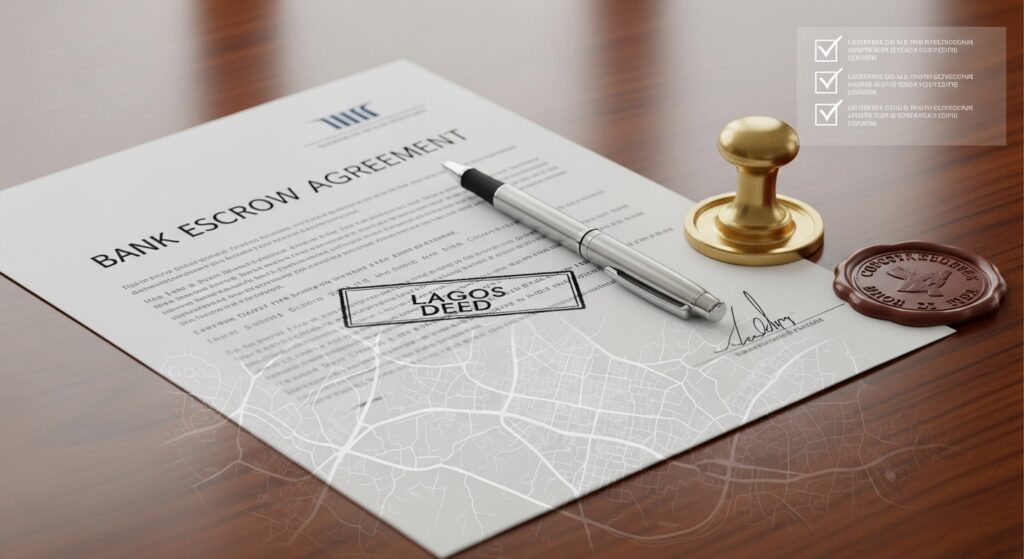Off-Market Deal Sourcing in Lagos: How We Quietly Find and Close Prime Assets in Eko Atlantic, Ikoyi, and VI

Introduction
In Lagos’ top sub-markets, the highest quality assets rarely arrive through public listings. They move through controlled channels where confidentiality, time, and credibility matter more than reach. Off-market sourcing is not a shortcut. It is a discipline that blends relationships with verifiable process: non-disclosure first, clean data next, and a closing architecture that a lender can underwrite without hesitation.
Our mandate in Eko Atlantic, Ikoyi, and Victoria Island follows three principles. First, protect the seller’s privacy while giving qualified buyers enough verified information to price risk accurately. Second, eliminate friction by aligning title, survey, and regulatory posture before any figure is tabled. Third, close with bankable mechanics: escrow, a tested waterfall, and documented step-in so capital is protected from first transfer to final handover. The outcome is a quieter market path that preserves value for both sides and avoids the noise that often erodes price discovery.
In this article, we outline how we source opportunities before they are broadly shopped, how we maintain controlled pipelines without leaks, and how we convert early access into clean, financeable transactions across Eko Atlantic, Ikoyi, and VI.
Why off-market works for serious sellers and buyers

Off-market is not secrecy for its own sake; it is transaction engineering. In Lagos’ prime corridors, sellers choose a private route to control disclosure, preserve momentum, and avoid the price erosion that follows leaks or prolonged “shop-around” campaigns. Buyers prefer it because it replaces auction theatrics with disciplined access: verified information, a clean due-diligence corridor, and a timetable that aligns with committee and lender processes.
For sellers, the advantages are clear. A controlled invitation list filters out noise and reduces the risk of reputational drift if a deal pauses or is re-priced. Pricing is discovered against evidence—title status, survey charting, permits, tenancy or offtake, and a realistic programme—rather than against speculation. The narrative stays factual: what the asset is, what risks are mitigated, and how completion will be delivered. Where the asset sits inside Eko Atlantic, private placement also simplifies coordination with estate consents, technical no-objection certificates, and service-charge clearances before a number goes on paper.
For buyers, off-market access buys time where it matters. Instead of reacting to an artificial bid deadline, capital can test bankability: does the chain of title stand up, will Governor’s Consent (or developer recognition, where applicable) issue within an acceptable window, and can escrow and waterfall be documented to protect funds from first transfer to final handover. Soft exclusivity—tied to objective milestones and short timeboxes—creates accountability without locking either side into a bad fit.
The legal architecture is also cleaner. Non-disclosure comes first, then a data room with source documents rather than sales brochures. Heads of terms memorialise the economics and key conditions precedent, while leaving space for proper drafting. If a buyer is corporate, proof of authority and funding is established early; if the seller holds through a vehicle, beneficial ownership and board mandates are confirmed before exclusivity starts. Each step reduces execution risk and keeps the price credible.
Done properly, off-market is not a discount to fair value; it is a premium to certainty. It replaces spectacle with process, and that is why serious counterparties gravitate to it in Eko Atlantic, Ikoyi, and VI.
How we source and screen without leaks or conflicts

Mandate-first sourcing. We prioritise direct mandates and principal-to-principal introductions. In Eko Atlantic, Ikoyi, and VI this often means developer pipelines, estate-level referrals, private owners with board approval to divest, and institutions managing balance-sheet rotations. Each approach starts with NDA and a single point of contact to prevent parallel conversations and price drift.
Tight buyer registration. Before sharing specifics, we register buyers: mandate scope, capital capacity, decision makers, counsel, and lender (if any). We avoid “maybe money.” Where an intermediary is involved, we map the principal and cap introductions at two degrees to stop chain leaks and fee disputes.
Data rooms, not email threads. We build a tiered data room with audit trails and watermarking. Tier 1 holds anonymised summaries and high-level financials. Tier 2 adds title documents, survey and charting materials, planning/estate approvals, service-charge statements, leases, QS and O&M packs. Access escalates only when proof of funds and identity checks are complete.
KYC/AML and conflict checks. We screen counterparties for beneficial ownership, sanctions, PEP status, litigation exposure, and conflicts with existing mandates. Any red flag pauses access. Internally, we ring-fence teams (matter codes, need-to-know folders, no multi-side briefings) and record recusals if a conflict emerges mid-process.
Early verification to protect price. We pre-check everything that moves valuation: root of title and chain, survey charting at the Surveyor-General, Governor’s Consent history or developer recognition (for estate interests), ground rent and land use charge status, building control and planning approvals, service-charge position, tenancy schedules, and technical baselines (QS, O&M, utilities). By removing ambiguity up front, we narrow the pricing band and reduce re-trades.
Positioning without hype. Our buyer notes focus on facts: legal posture, measurable risks with mitigants, capex and cost-to-complete, comp set and replacement cost, expected exit paths, and timelines for consents and perfection. For Eko Atlantic assets, we add estate-level requirements (design NOCs, utilities interface, step-in recognition) so lenders can size risk on day one.
Leak prevention discipline. We use code names, numbered documents, watermarked downloads, and no WhatsApp forwarding of sensitive files. Updates are batched through the deal room. Internally, we keep the working group small and escalate via written memos to avoid rumour loops.
Exclusivity that earns its keep. Soft exclusivity is milestone-based and short. If a buyer misses verification deadlines or can’t evidence funding, access reverts to multi-party quietly. Sellers get speed; serious buyers get a clear corridor to diligence without auction theatrics.
From handshake to handover: verification and closing mechanics

A quiet deal only stays quiet if execution is disciplined. Once commercial terms are aligned, we move immediately into a verification runway that locks facts before signatures start flying. Title is traced to root and matched against Certified True Copies; the survey is charted at the Office of the Surveyor-General; any community claims or encumbrances are flushed early; fiscal posture (ground rent, land use charge, penalties) is reconciled to receipts; planning and building-control status is confirmed against approved drawings. Inside Eko Atlantic, we add the estate track: technical no-objection, utilities interface, service-charge standing, and confirmation that the developer will recognise lender step-in on any charge. The objective is to take price out of the realm of assumption and into evidence before exclusivity matures.
Contract architecture follows. Heads of terms capture economics and critical conditions precedent, but the binding documents must do the heavy lifting. For asset sales, the deed of assignment is paired with a completion protocol, a representations-and-warranties suite covering capacity, title, encumbrances, litigation, fiscal compliance, and possession, and a tailored indemnity schedule that survives registration. For share deals, the share purchase agreement addresses beneficial ownership, change-of-control consents, intra-group liabilities, and completion accounts, with warranties re-stated at completion. Where debt is involved, intercreditor and recognition agreements are settled alongside the sale documents so that consent thresholds, cure periods, and step-in align across the stack. We avoid conflicting definitions by harmonising the articles, shareholders’ agreement, finance documents, and conveyancing instruments before anyone countersigns.
Closing mechanics are engineered to remove timing risk. Funds sit in a bank-managed escrow with objective release conditions: duties assessed and paid; consent application filed (or developer consent issued for estate interests); insurance noted; QS or technical certificates where a stage payment is justified; evidence of planning and building-control compliance; service-charge arrears cleared. Registration receipts and consent letters are conditions subsequent with fixed delivery windows; if a gap is unavoidable, limited title-gap insurance covers enforceability until perfection lands. For income assets, we overlay an assignment of rents with a standing non-disturbance arrangement for anchors so the cashflow stays bankable through completion. Final handover then becomes procedural: originals exchanged, folio updated, utilities re-papered, access credentials re-issued, and a closing memorandum compiled with the full chain, filings, receipts, and post-completion deliverables. The result is a transfer that stands up to lender audit today and resale diligence tomorrow.
Conclusion
Off-market sourcing works in Lagos when privacy, evidence, and execution move together. Sellers protect value by controlling disclosure and sequencing verification before price conversations harden. Qualified buyers gain a disciplined corridor to diligence, with time to align committees, lenders, and counsel. The result is not secrecy for its own sake; it is a cleaner path to a bankable transfer.
Our approach is simple. We start with mandate clarity and NDAs. We build data rooms around primary documents, not brochures. We verify chain, survey, permits, and fiscal posture before exclusivity matures. In Eko Atlantic, we add estate consents, technical clearances, and recognition of lender step-in so that estate rules and state law align. Escrow, waterfall, and step-in rights are documented ahead of funds flow. At completion, the file reads like an audit: originals, certified copies, receipts, and a closing memorandum that will survive lender review and future resale.
Quiet deals succeed when the market sees discipline in place of noise. That is how we convert early access into defensible pricing, timely completion, and assets that remain financeable across cycles.